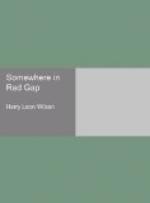It was delicate work, let me tell you, turning down folks that wanted to sing patriotic songs or recite war poetry that would be sure to start something, with Professor Gluckstein wishing to get up and tell how the cowardly British had left the crew of a German submarine to perish after shooting it up when it was only trying to sink their cruiser by fair and lawful methods; and Henry Lehman wanting to read a piece from a German newspaper about how the United States was a nation of vile money-grubbers that would sell ammunition to the enemy just because they had the ships to take it away, and wouldn’t sell a dollar’s worth to the Fatherland, showing we had been bought up by British gold—and so on.
But I kept neutral. I even turned down an Englishman named Ruggles, that keeps the U.S. Grill and is well thought of, though he swore that all he would do was to get off a few comical riddles, and such. He’d just got a new one that goes: “Why is an elephant like a corkscrew? Because there’s a ‘b’ in both.” I didn’t see it at first, till he explained with hearty laughter—because there’s a “b” in both—the word “both.” See? Of course there’s no sense to it. He admitted there wasn’t, but said it was a jolly wheeze just the same. I might have took a chance with him, but he went on to say that he’d sent this wheeze to the brave lads in the trenches, along with a lot of cigars and tobacco, and had got about fifty postcards from ’em saying it was the funniest thing they’d heard since the war begun. And in a minute more he was explaining, with much feeling, just what low-down nation it was that started the war—it not being England, by any means—and I saw he wasn’t to be trusted on his feet.
So I smoothed him down till he promised to donate all the lemonade for Aggie Tuttle, who was to be Rebekkah at the Well; and I smoothed Henry Lehman till he said he’d let his folks come and buy chances on things, even if the country was getting overrun by foreigners, with an Italian barber shop just opened in the same block with his sanitary shaving parlour; though—thank goodness—the Italian hadn’t had much to do yet but play on a mandolin. And I smoothed Professor Gluckstein down till he agreed to furnish the music for us and let the war take care of itself.
The Prof’s a good old scout when he ain’t got his war bonnet on. He was darned near crying into his meerschaum pipe with a carved fat lady on it when I got through telling him about the poor soldiers in the wet and cold without a thing to smoke. He says: “You’re right, madam; with Jake Frost in the trenches and no tobacco, all men should be brothers under their hides.” And I got that printed in the Recorder for a slogan, and other foreigners come into line; and things looked pretty good.




